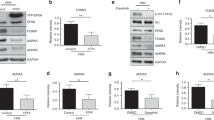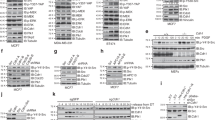Abstract
Kruppel-like factor 8 (KLF8) is a member of the family of KLF transcription factors. Several KLF members have been shown to play a role in oncogenesis. We have previously demonstrated that KLF8 mediates cell cycle progression downstream of focal adhesion kinase (FAK) by upregulating cyclin D1. FAK plays a critical role in transformation and tumorigenesis and is aberrantly upregulated in many types of human cancer. Little is known about the function of KLF8 in these regards. Here we provide evidence suggesting a novel role of KLF8 in oncogenic transformation. We show that KLF8 expression is elevated in several types of human cancer cells and primary tumor tissues. Induced expression of ectopic KLF8 causes serum-independent growth and morphological transformation in NIH3T3 cells and enhances anchorage-independent growth of v-Src-transformed cells. In contrast, expression of a dominant-negative mutant of KLF8 dramatically suppresses the transformed phenotypes induced by v-Src. In addition, the KLF8-enhanced transformation in the v-Src cells was prevented by ablating cyclin D1 expression. Overall, these results indicate that KLF8 is required for v-Src-induced transformation and may play a role in tumor progression of human cancer.
This is a preview of subscription content, access via your institution
Access options
Subscribe to this journal
Receive 50 print issues and online access
$259.00 per year
only $5.18 per issue
Buy this article
- Purchase on Springer Link
- Instant access to full article PDF
Prices may be subject to local taxes which are calculated during checkout




Similar content being viewed by others
References
Benlimame N, He Q, Jie S, Xiao D, Xu YJ, Loignon M et al. (2005). J Cell Biol 171: 505–516.
Bieker JJ . (2001). J Biol Chem 276: 34355–34358.
Cance WG, Harris JE, Iacocca MV, Roche E, Yang X, Chang J et al. (2000). Clin Cancer Res 6: 2417–2423.
Chen C, Bhalala HV, Qiao H, Dong JT . (2002). Oncogene 21: 6567–6572.
Chen C, Hyytinen ER, Sun X, Helin HJ, Koivisto PA, Frierson HF et al. (2003). Am J Pathol 162: 1349–1354.
Diehl JA . (2002). Cancer Biol Ther 1: 226–231.
Dong JT . (2001). Cancer Metast Rev 20: 173–193.
Ellenrieder V, Buck A, Harth A, Jungert K, Buchholz M, Adler G et al. (2004). Gastroenteroloy 127: 607–620.
Frame MC . (2004). J Cell Sci 117: 989–998.
Frisch SM, Vuori K, Ruoslahti E, Chan-Hui PY . (1996). J Cell Biol 134: 793–799.
Gabarra-Niecko V, Schaller MD, Dunty JM . (2003). Cancer Metast Rev 22: 359–374.
Ghaleb AM, Nandan MO, Chanchevalap S, Dalton WB, Hisamuddin IM, Yang VW . (2005). Cell Res 15: 92–96.
Grisaru-Granovsky S, Salah Z, Maoz M, Pruss D, Beller U, Bar-Shavit R . (2005). Int J Cancer 113: 372–378.
Kimmelman AC, Qiao RF, Narla G, Banno A, Lau N, Bos PD et al. (2004). Oncogene 23: 5077–5083.
Leslie K, Lang C, Devgan G, Azare J, Berishaj M, Gerald W et al. (2006). Cancer Res 66: 2544–2552.
Lim KH, Counter CM . (2004). Mol Cell 15: 491–492.
Liu J, Yang G, Thompson-Lanza JA, Glassman A, Hayes K, Patterson A et al. (2004). Cancer Res 64: 1655–1663.
McLean GW, Komiyama NH, Serrels B, Asano H, Reynolds L, Conti F et al. (2004). Genes Dev 18: 2998–3003.
Nandan MO, Yoon HS, Zhao W, Ouko LA, Chanchevalap S, Yang VW . (2004). Oncogene 23: 3404–3413.
Reeves HL, Narla G, Ogunbiyi O, Haq AI, Katz A, Benzeno S et al. (2004). Gastroenterology 126: 1090–1103.
Renshaw MW, Price LS, Schwartz MA . (1999). J Cell Biol 147: 611–618.
Schlaepfer DD, Hauck CR, Sieg DJ . (1999). Prog Biophys Mol Biol 71: 435–478.
Schlaepfer DD, Mitra SK . (2004). Curr Opin Genet Dev 14: 92–101.
Sood AK, Coffin JE, Schneider GB, Fletcher MS, DeYoung BR, Gruman LM et al. (2004). Am J Pathol 165: 1087–1095.
Summy JM, Gallick GE . (2003). Cancer Metast Rev 22: 337–358.
van Nimwegen MJ, Verkoeijen S, van Buren L, Burg D, van de Water B . (2005). Cancer Res 65: 4698–4706.
van Vliet J, Turner J, Crossley M . (2000). Nucleic Acids Res 28: 1955–1962.
Wei H, Wang X, Gan B, Urvalek AM, Melkoumian ZK, Guan JL et al. (2006). J Biol Chem 281: 16664–16671.
Zhao J, Bian ZC, Yee K, Chen BP, Chien S, Guan JL . (2003). Mol Cell 11: 1503–1515.
Zhao J, Pestell R, Guan JL . (2001). Mol Biol Cell 12: 4066–4077.
Zhao J, Zheng C, Guan J . (2000). J Cell Sci 113(Part 17): 3063–3072.
Zhao W, Hisamuddin IM, Nandan MO, Babbin BA, Lamb NE, Yang VW . (2004). Oncogene 23: 395–402.
Acknowledgements
We thank Drs Jinsong Liu (T80) and Dihua Yu (SKOV3ip1) of the University of Texas, MD Anderson Cancer Center, Jin Q Cheng (SKOV3 and OVCAR5) of University of South Florida College of Medicine, C Michael DiPersio (MCF-7 and MDA-MB-231) and Gang Liu (MCF-10A) of our Center for kindly providing the cell lines. This work was supported by Albany Medical College Institutional Grant, Wendy Will Case Cancer Fund and American Cancer Society Grant (RSG CCG-111381) to JZ.
Author information
Authors and Affiliations
Corresponding author
Rights and permissions
About this article
Cite this article
Wang, X., Zhao, J. KLF8 transcription factor participates in oncogenic transformation. Oncogene 26, 456–461 (2007). https://doi.org/10.1038/sj.onc.1209796
Received:
Revised:
Accepted:
Published:
Issue Date:
DOI: https://doi.org/10.1038/sj.onc.1209796
Keywords
This article is cited by
-
CircRNA PVT1 promotes proliferation and chemoresistance of osteosarcoma cells via the miR-24-3p/KLF8 axis
International Journal of Clinical Oncology (2022)
-
LncRNA DANCR promotes the proliferation, migration, and invasion of tongue squamous cell carcinoma cells through miR-135a-5p/KLF8 axis
Cancer Cell International (2019)
-
KLF8 overexpression promotes the growth of human lung cancer cells by promoting the expression of JMJD2A
Cancer Cell International (2019)
-
Krüppel-Like Factor 8 Overexpression Correlates with Poor Prognosis in Non-Small Cell Lung Cancer
Pathology & Oncology Research (2019)
-
Single-cell RNA-seq reveals novel regulators of human embryonic stem cell differentiation to definitive endoderm
Genome Biology (2016)



